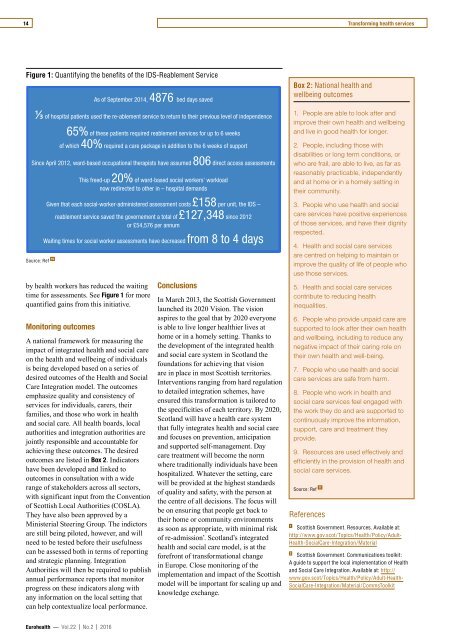EUROHEALTH
Eurohealth-volume22-number2-2016
Eurohealth-volume22-number2-2016
You also want an ePaper? Increase the reach of your titles
YUMPU automatically turns print PDFs into web optimized ePapers that Google loves.
14<br />
Transforming health services<br />
Figure 1: Quantifying the benefits of the IDS-Reablement Service<br />
As of September 2014, 4876 bed days saved<br />
⅓ of hospital patients used the re-ablement service to return to their previous level of independence<br />
65% of these patients required reablement services for up to 6 weeks<br />
Source: Ref 10<br />
of which 40% required a care package in addition to the 6 weeks of support<br />
Since April 2012, ward‐based occupational therapists have assumed 806 direct access assessments<br />
by health workers has reduced the waiting<br />
time for assessments. See Figure 1 for more<br />
quantified gains from this initiative.<br />
Monitoring outcomes<br />
This freed‐up 20% of ward‐based social workers’ workload<br />
now redirected to other in – hospital demands<br />
Given that each social‐worker‐administered assessment costs £158 per unit, the IDS –<br />
reablement service saved the governement a total of £127,348 since 2012<br />
or £54,576 per annum<br />
Waiting times for social worker assessments have decreased from 8 to 4 days<br />
A national framework for measuring the<br />
impact of integrated health and social care<br />
on the health and wellbeing of individuals<br />
is being developed based on a series of<br />
desired outcomes of the Health and Social<br />
Care Integration model. The outcomes<br />
emphasize quality and consistency of<br />
services for individuals, carers, their<br />
families, and those who work in health<br />
and social care. All health boards, local<br />
authorities and integration authorities are<br />
jointly responsible and accountable for<br />
achieving these outcomes. The desired<br />
outcomes are listed in Box 2. Indicators<br />
have been developed and linked to<br />
outcomes in consultation with a wide<br />
range of stakeholders across all sectors,<br />
with significant input from the Convention<br />
of Scottish Local Authorities (COSLA).<br />
They have also been approved by a<br />
Ministerial Steering Group. The indictors<br />
are still being piloted, however, and will<br />
need to be tested before their usefulness<br />
can be assessed both in terms of reporting<br />
and strategic planning. Integration<br />
Authorities will then be required to publish<br />
annual performance reports that monitor<br />
progress on these indicators along with<br />
any information on the local setting that<br />
can help contextualize local performance.<br />
Conclusions<br />
In March 2013, the Scottish Government<br />
launched its 2020 Vision. The vision<br />
aspires to the goal that by 2020 everyone<br />
is able to live longer healthier lives at<br />
home or in a homely setting. Thanks to<br />
the development of the integrated health<br />
and social care system in Scotland the<br />
foundations for achieving that vision<br />
are in place in most Scottish territories.<br />
Interventions ranging from hard regulation<br />
to detailed integration schemes, have<br />
ensured this transformation is tailored to<br />
the specificities of each territory. By 2020,<br />
Scotland will have a health care system<br />
that fully integrates health and social care<br />
and focuses on prevention, anticipation<br />
and supported self-management. Day<br />
care treatment will become the norm<br />
where traditionally individuals have been<br />
hospitalized. Whatever the setting, care<br />
will be provided at the highest standards<br />
of quality and safety, with the person at<br />
the centre of all decisions. The focus will<br />
be on ensuring that people get back to<br />
their home or community environments<br />
as soon as appropriate, with minimal risk<br />
of re-admission’. Scotland’s integrated<br />
health and social care model, is at the<br />
forefront of transformational change<br />
in Europe. Close monitoring of the<br />
implementation and impact of the Scottish<br />
model will be important for scaling up and<br />
knowledge exchange.<br />
Box 2: National health and<br />
wellbeing outcomes<br />
1. People are able to look after and<br />
improve their own health and wellbeing<br />
and live in good health for longer.<br />
2. People, including those with<br />
disabilities or long term conditions, or<br />
who are frail, are able to live, as far as<br />
reasonably practicable, independently<br />
and at home or in a homely setting in<br />
their community.<br />
3. People who use health and social<br />
care services have positive experiences<br />
of those services, and have their dignity<br />
respected.<br />
4. Health and social care services<br />
are centred on helping to maintain or<br />
improve the quality of life of people who<br />
use those services.<br />
5. Health and social care services<br />
contribute to reducing health<br />
inequalities.<br />
6. People who provide unpaid care are<br />
supported to look after their own health<br />
and wellbeing, including to reduce any<br />
negative impact of their caring role on<br />
their own health and well-being.<br />
7. People who use health and social<br />
care services are safe from harm.<br />
8. People who work in health and<br />
social care services feel engaged with<br />
the work they do and are supported to<br />
continuously improve the information,<br />
support, care and treatment they<br />
provide.<br />
9. Resources are used effectively and<br />
efficiently in the provision of health and<br />
social care services.<br />
Source: Ref 11<br />
References<br />
1<br />
Scottish Government. Resources. Available at:<br />
http://www.gov.scot/Topics/Health/Policy/Adult-<br />
Health-SocialCare-Integration/Material<br />
2<br />
Scottish Government. Communications toolkit:<br />
A guide to support the local implementation of Health<br />
and Social Care Integration. Available at: http://<br />
www.gov.scot/Topics/Health/Policy/Adult-Health-<br />
SocialCare-Integration/Material/CommsToolkit<br />
Eurohealth — Vol.22 | No.2 | 2016
















